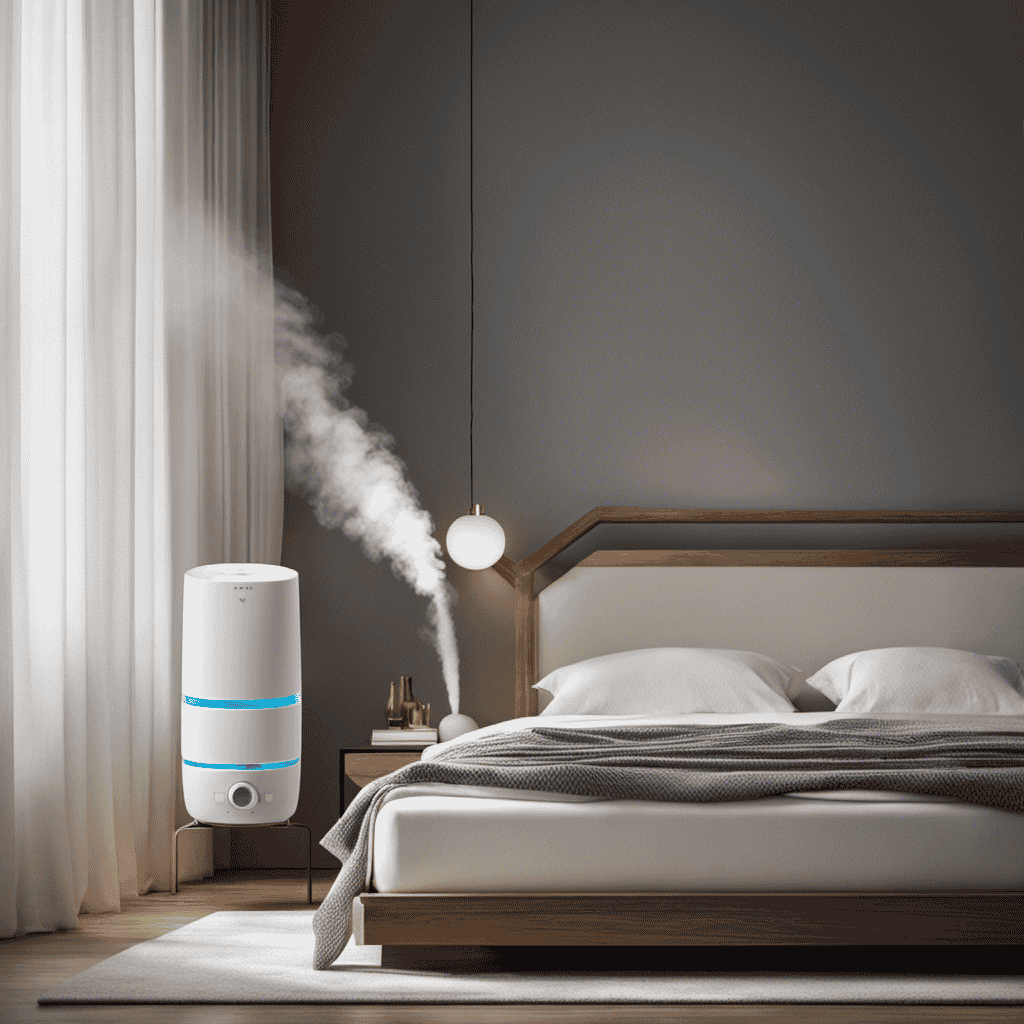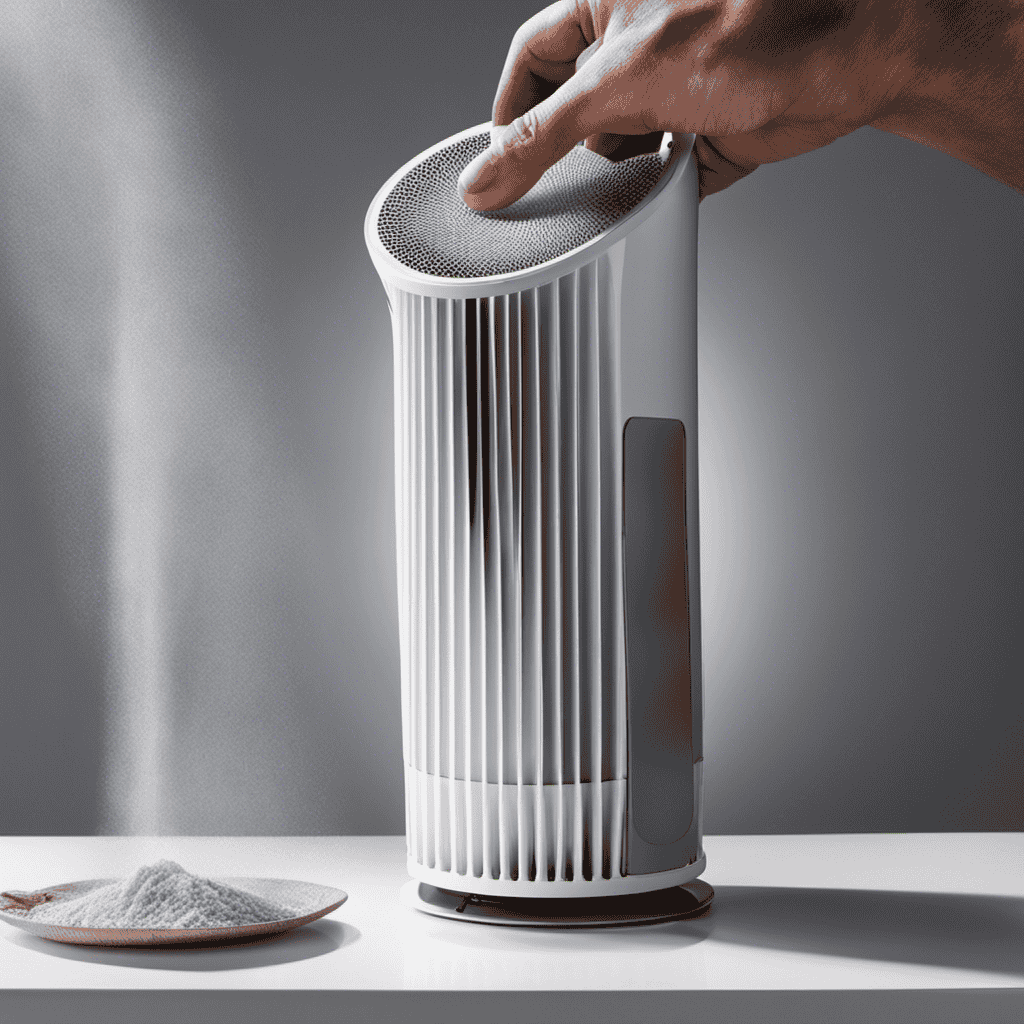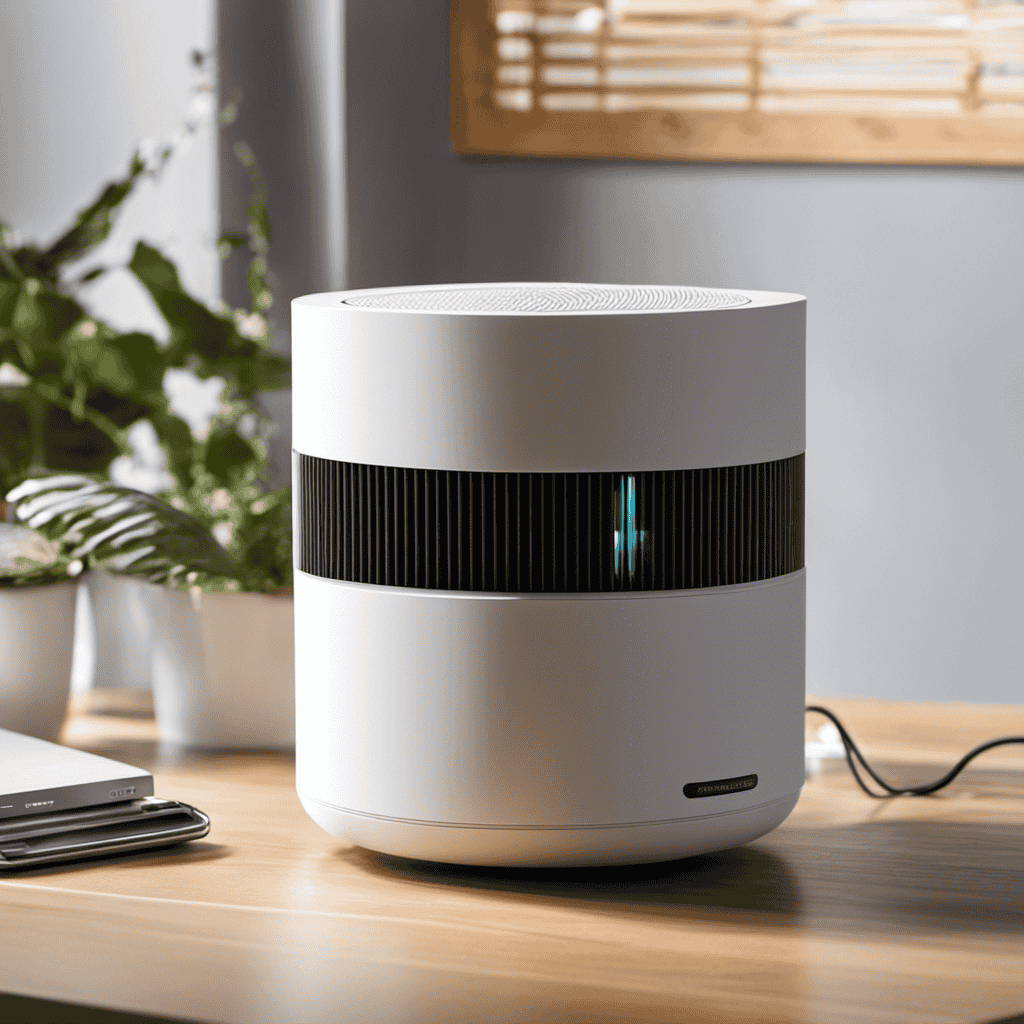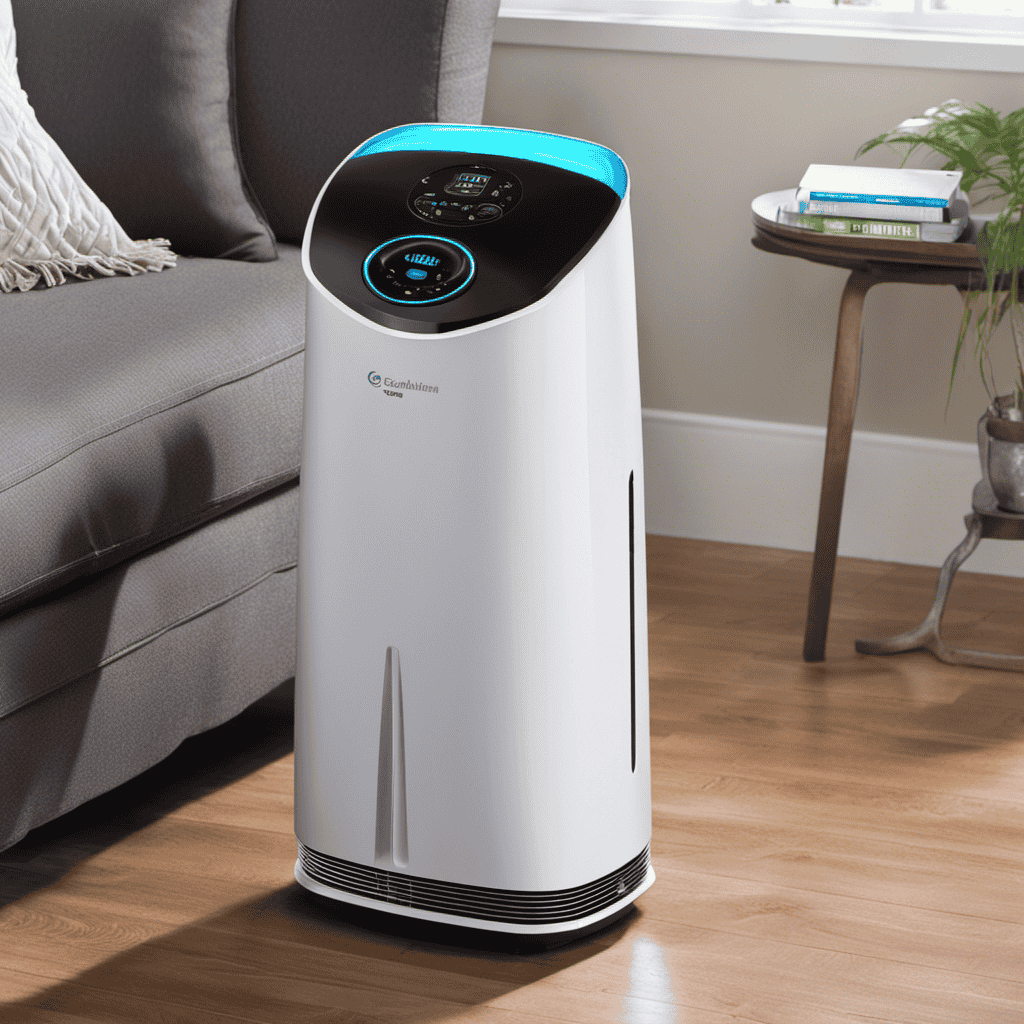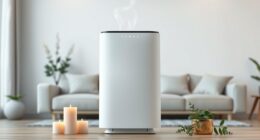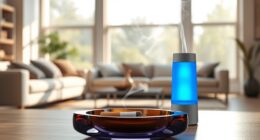When I enter my house, I am welcomed by the comforting hug of clean, fresh air. This sensation can only be attained with the appropriate indoor air quality solutions.
But when it comes to choosing between a humidifier and an air purifier, the decision can be overwhelming. That’s why I have delved into the research, exploring the benefits of both.
In this article, I will share my findings and help you make an informed choice that will enhance the air you breathe.
Key Takeaways
- Humidifiers relieve dry skin, soothe irritated nasal passages, improve sleep quality, and reduce snoring.
- Air purifiers remove allergens, eliminate harmful gases and odors, improve overall air quality, and reduce indoor air pollution.
- When choosing between a humidifier and an air purifier, factors to consider include specific needs and benefits, moisturizing the air (humidifier), removing allergens (air purifier), odor elimination (air purifier), and maintenance requirements.
- Humidifiers can improve indoor air quality by alleviating symptoms of dry skin, itchy eyes, and nasal congestion, reducing static electricity, and protecting wooden furniture from cracking. Air purifiers remove harmful airborne particles, provide numerous health benefits, prevent allergies and allergy symptoms, reduce the risk of respiratory infections, and improve indoor air quality for a healthier living space.
Benefits of a Humidifier
You’ll love the benefits of a humidifier, such as relieving dry skin and soothing irritated nasal passages. Research has shown that using a humidifier in your bedroom can greatly improve sleep quality by adding moisture to the air and preventing dryness in the throat and nasal passages. This can help reduce snoring and promote a more restful sleep.
Additionally, a humidifier can provide much-needed relief from dry skin, especially during the winter months when the air tends to be drier. By increasing the humidity levels in your home, a humidifier can help alleviate dry and itchy skin, leaving it feeling moisturized and hydrated.
Now, let’s explore the advantages of an air purifier and how it can enhance the air quality in your living space.
Advantages of an Air Purifier
If you’re looking to improve the air quality in your home, an air purifier can be a great option.
Air purifiers have numerous advantages when it comes to air filtration and can effectively remove pollutants from the air.
One of the main advantages of air purifiers is their ability to remove allergens such as pollen, dust mites, and pet dander. This is especially beneficial for individuals suffering from allergies or asthma.
Additionally, air purifiers can also eliminate harmful gases and odors, making the air in your home fresher and cleaner.
Research has shown that air purifiers can be highly effective in reducing indoor air pollution and improving overall air quality.
With their advanced filtration systems and innovative technologies, air purifiers provide an efficient and reliable solution for creating a healthier living environment.
Factors to Consider When Choosing Between a Humidifier and an Air Purifier
When deciding between a humidifier and an air purifier, it’s important to consider factors such as your specific needs and the benefits each option provides. A humidifier adds moisture to the air, making it beneficial for those with dry skin or respiratory issues. On the other hand, an air purifier helps remove allergens, pollutants, and odors from the air, improving overall air quality. To help you make an informed decision, I’ve created a table below that compares these two options:
| Factors to Consider | Humidifier | Air Purifier |
|---|---|---|
| Moisturizing the Air | ✓ | |
| Removing Allergens | ✓ | |
| Odor Elimination | ✓ | |
| Maintenance | Regular cleaning and filter replacement | Regular cleaning and filter replacement |
Both options require regular maintenance to ensure optimal performance. Humidifiers need to be cleaned regularly to prevent the growth of mold and bacteria. Air purifiers also require regular cleaning and filter replacement to maintain their effectiveness. So, when choosing between a humidifier and an air purifier, consider your specific needs and the importance of maintenance for each option.
How a Humidifier Can Improve Indoor Air Quality
Adding moisture to the air with a humidifier can help improve indoor air quality. Humidifiers offer several benefits when it comes to creating a healthier living environment. They can alleviate symptoms of dry skin, itchy eyes, and nasal congestion. Moreover, they can help reduce static electricity and protect wooden furniture from cracking due to dry air.
When choosing a humidifier, it is important to consider a few key factors. First, determine the size of the room that needs to be humidified. This will help you select the appropriate humidifier capacity. Second, decide whether you want a warm mist or cool mist humidifier, as both types have their own advantages. Lastly, consider the maintenance requirements and noise level of the humidifier to ensure it fits your lifestyle.
Overall, by selecting the right humidifier, you can significantly improve your indoor air quality and enjoy the many benefits it offers.
Reasons to Invest in an Air Purifier
Investing in an air purifier can greatly improve the quality of your indoor environment. Not only does it remove harmful airborne particles, but it also provides numerous health benefits and prevents allergies.
Air purifiers work by filtering out pollutants such as dust, pet dander, pollen, and mold spores, which can trigger allergies and respiratory issues. By removing these allergens from the air, air purifiers can help prevent allergy symptoms like sneezing, coughing, and watery eyes.
Moreover, air purifiers can also reduce the risk of respiratory infections by eliminating bacteria and viruses from the air. Research shows that using an air purifier in your home can significantly improve indoor air quality, leading to a healthier and more comfortable living space.
What Are the Differences Between a Humidifier and an Air Purifier?
When it comes to improving indoor air quality, it’s important to understand the differences between a humidifier vs air purifier. While a humidifier adds moisture to the air, an air purifier removes impurities like dust, pollen, and pet dander. Using both devices together can create a healthier living environment.
Frequently Asked Questions
Can a Humidifier Help Alleviate Symptoms of Allergies or Asthma?
A humidifier can help alleviate symptoms of allergies or asthma by adding moisture to the air, reducing dryness and irritation. However, an air purifier is more effective in removing allergens and pollutants from the air, improving indoor air quality.
Are There Any Potential Health Risks Associated With Using an Air Purifier?
There are potential risks associated with using an air purifier, such as ozone emissions and noise pollution. When comparing effectiveness, it depends on the specific needs and preferences of the individual.
Can a Humidifier Help Prevent Dry Skin and Alleviate Respiratory Issues During the Winter Months?
A humidifier can be beneficial during the winter months by helping to prevent dry skin and alleviate respiratory issues. It adds moisture to the air, which can provide relief for dry nasal passages and reduce symptoms like coughing and congestion.
What Are the Maintenance Requirements for a Humidifier or an Air Purifier?
When it comes to maintenance, both humidifiers and air purifiers require regular attention. Humidifier maintenance includes cleaning the tank, replacing filters, and monitoring humidity levels. Air purifier maintenance involves changing filters and cleaning the unit regularly.
Can an Air Purifier Remove Pet Dander and Odors From the Air?
An air purifier can effectively remove pet dander and reduce odors from the air. It filters out microscopic particles and traps them, providing cleaner and fresher air for those with allergies or sensitivities.
Conclusion
In conclusion, both humidifiers and air purifiers have their own unique benefits and advantages.
A humidifier can improve indoor air quality by adding moisture to the air. This can be especially beneficial in dry climates or during the winter months when the air tends to be drier.
On the other hand, an air purifier can effectively remove pollutants and allergens from the air. This can be particularly helpful for individuals with respiratory conditions or allergies.
When choosing between the two, it is important to consider factors such as your specific needs and the quality of your indoor air.
According to a recent study by the Environmental Protection Agency, indoor air can be up to 5 times more polluted than outdoor air. This highlights the significance of investing in an air purifier for cleaner and healthier air.
In conclusion, both humidifiers and air purifiers can play a role in improving indoor air quality. It is important to assess your specific needs and consider the quality of your indoor air before making a decision.
